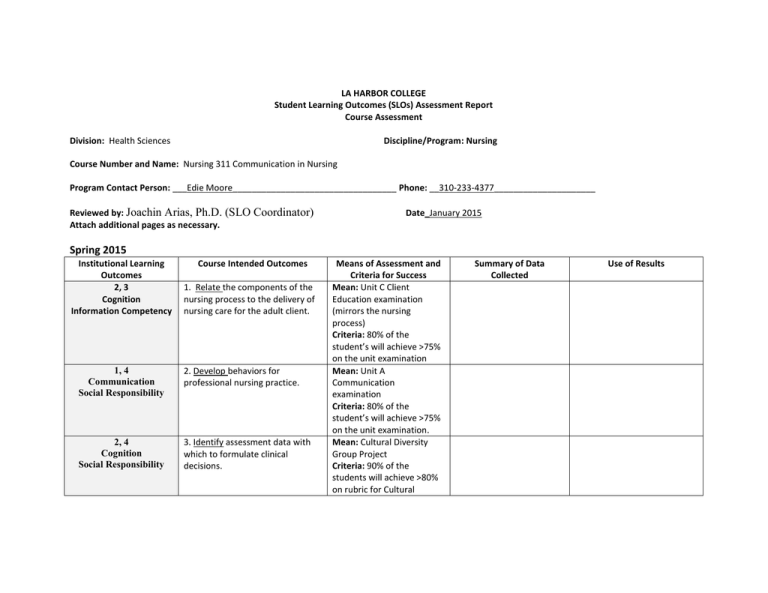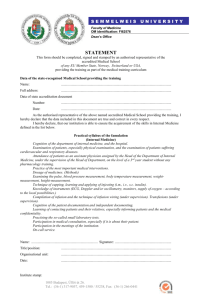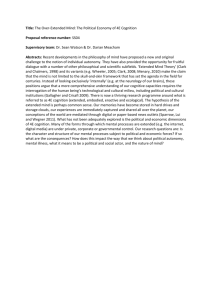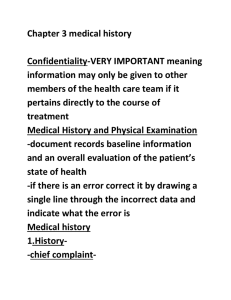Assessment Form
advertisement

LA HARBOR COLLEGE Student Learning Outcomes (SLOs) Assessment Report Course Assessment Division: Health Sciences Discipline/Program: Nursing Course Number and Name: Nursing 311 Communication in Nursing Program Contact Person: ___Edie Moore__________________________________ Phone: __310-233-4377_____________________ Reviewed by: Joachin Arias, Ph.D. Attach additional pages as necessary. (SLO Coordinator) Date_January 2015 Spring 2015 Institutional Learning Outcomes 2, 3 Cognition Information Competency Course Intended Outcomes 1. Relate the components of the nursing process to the delivery of nursing care for the adult client. 1, 4 Communication Social Responsibility 2. Develop behaviors for professional nursing practice. 2, 4 Cognition Social Responsibility 3. Identify assessment data with which to formulate clinical decisions. Means of Assessment and Criteria for Success Mean: Unit C Client Education examination (mirrors the nursing process) Criteria: 80% of the student’s will achieve >75% on the unit examination Mean: Unit A Communication examination Criteria: 80% of the student’s will achieve >75% on the unit examination. Mean: Cultural Diversity Group Project Criteria: 90% of the students will achieve >80% on rubric for Cultural Summary of Data Collected Use of Results Diversity Group Project 1, 2, 4 Communication Cognition Social Responsibility 4. Provide safe, patient-centered care. Mean: Unit B Culture and Ethnicity examination. Criteria: 80% of the students will achieve > 75% on unit examination 1, 2, 4 Communication Cognition Social Responsibility 5. Describe roles of health care team members and develop effective strategies for communication. Mean: Unit D Group Process examination. Criteria: 80% of the student’s will achieve >75% on the unit examination. 6. Identify evidence-based practices to support clinical reasoning. Mean: Selection and evaluation of evidencebased study that support selected stress reduction technique used in teaching assignment. Criteria: 80% of the student will select an appropriate evidence-based study. 7. Implement a personal quality improvement project. Mean: Process recordings Criteria: 85% of process recordings submitted will score >15/20 (75%) on this evidence-based tool. Mean: Culture Presentation Peer Evaluation Criteria: 100% of students will submit peer evaluation forms EMR not utilized in this 2,3 Cognition Information Competency 2,4 Cognition Social Responsibility 2,3,4 8. Identify the impact of n/a n/a Cognition Information Competency Social Responsibility information technology in the clinical setting and guidelines for protected health information. course Fall 2014 Institutional Learning Outcomes 2, 3 Cognition Information Competency Course Intended Outcomes 1. Relate the components of the nursing process to the delivery of nursing care for the adult client. 1, 4 Communication Social Responsibility 2. Develop behaviors for professional nursing practice. 2, 4 Cognition Social Responsibility 3. Identify assessment data with which to formulate clinical decisions. Means of Assessment and Criteria for Success Mean: Unit C Client Education examination (mirrors the nursing process) Criteria: 80% of the student’s will achieve >75% on the unit examination Mean: Unit A Communication examination and in-class Communication exercise. Criteria: 80% of the student’s will achieve >75% on the unit examination and in-class communication exercise. Mean: Cultural Diversity Group Project Criteria: 90% of the students will achieve >80% on rubric for Cultural Diversity Group Project Summary of Data Collected Use of Results UNMET: 77% of students achieved >75% on combined Unit C/D Exam Plan to separate unit exams to target issues and trend results. MET: 80% (36/45) students achieved >75% on combined Unit A/B exam Plan to separate unit exams to target issues and trend results. n/a Piloted Cultural Diversity Group Project from an in class exercise to a take home group project. Rubric created. Will evaluate next semester. 1, 2, 4 Communication Cognition Social Responsibility 4. Provide safe, patient-centered care. Mean: Unit B Culture and Ethnicity examination. Criteria: 80% of the students will achieve > 75% on unit examination MET: 80% (36/45) students achieved >75% on combined Unit A/B exam Plan to separate unit exams to target issues and trend results. 1, 2, 4 Communication Cognition Social Responsibility 5. Describe roles of health care team members and develop effective strategies for communication. Mean: Unit D Group Process examination. Criteria: 80% of the student’s will achieve >75% on the unit examination. UNMET: 77% of students achieved >75% on combined Unit C/D Exam Plan to separate unit exams to target issues and trend results. 6. Identify evidence-based practices to support clinical reasoning. Mean: Selection and evaluation of evidencebased study that support selected stress reduction technique used in teaching assignment. Criteria: 80% of the student will select an appropriate evidence-based study. Not implemented for Fall 2014. Piloted new teaching project for logistics. Will add evidencebased component next semester. 7. Implement a personal quality improvement project. Mean: Process recordings Criteria: 80% of students will score 15/20 (75%) or higher per rubric on this evidence-based tool that improves therapeutic communication. Mean: Culture Presentation Peer Evaluation Criteria: 100% of students will submit peer evaluation forms EMR not utilized in this MET: 87% (117/135) of process recordings achieved >75% Continue to monitor 2,3 Cognition Information Competency 2,4 Cognition Social Responsibility 2,3,4 8. Identify the impact of MET: 100% of students submitted peer evaluation n/a n/a Cognition Information Competency Social Responsibility information technology in the clinical setting and guidelines for protected health information. course




